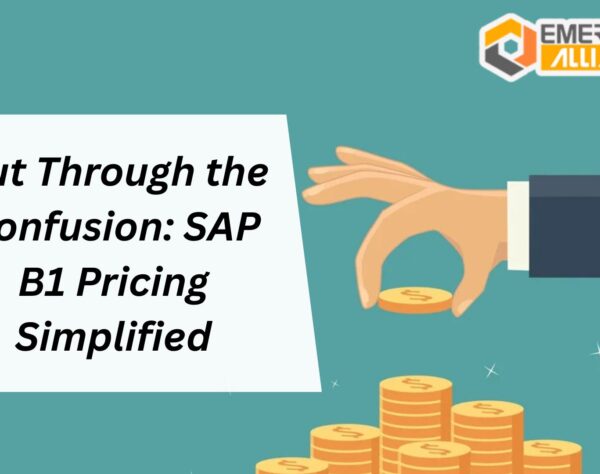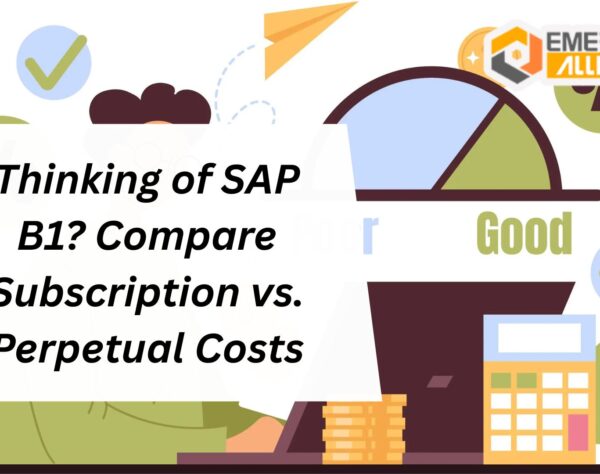
Better Care Starts Here – SAP B1 for Healthcare Innovation

Why SAP B1 is Transforming Healthcare Operations
The healthcare industry faces constant pressure to deliver high-quality patient care while managing operational challenges, regulatory compliance, and cost control. Traditional healthcare management systems are often fragmented, leading to data silos, inefficient workflows, and poor patient experiences. This is where SAP B1 (SAP Business One) steps in as a game-changer.
Designed specifically for small and mid-sized healthcare organizations, SAP B1 centralizes data, automates key processes, and provides real-time insights to enhance decision-making. From patient care to financial management, SAP B1 offers a complete solution to streamline healthcare operations and improve patient outcomes. In this blog, we explore how SAP B1 is driving healthcare innovation and why it’s becoming the preferred solution for modern healthcare organizations.
Why Healthcare Needs SAP B1
The healthcare industry is complex, with multiple moving parts that must work together seamlessly. Hospitals, clinics, and healthcare providers need an integrated system to manage patient records, financial operations, inventory, and compliance — all while ensuring high standards of care.
Key Challenges Faced by Healthcare Organizations:
✅ Data Silos – Patient records, financial data, and medical inventory are often stored in separate systems, creating inefficiencies and increasing the risk of errors.
✅ Regulatory Compliance – Healthcare providers must comply with strict regulations like HIPAA and GDPR to protect patient information.
✅ Cost Management – Rising operational costs and reimbursement challenges require better financial oversight and resource allocation.
✅ Patient Care Quality – Without a unified system, managing patient care becomes complex and prone to miscommunication.
✅ Scalability – Growing healthcare organizations need a flexible and scalable solution to adapt to increasing patient loads and operational complexity.
SAP B1 addresses these challenges by providing a single, integrated platform that connects all aspects of healthcare operations, from patient care to financial management.
How SAP B1 is Driving Healthcare Innovation
1. Centralized Data Management
Healthcare providers handle massive amounts of data daily — from patient records and treatment plans to financial data and operational reports. Traditionally, this data is scattered across multiple systems, leading to delays, errors, and data silos.
SAP B1 solves this challenge by consolidating all data into a single platform, ensuring that healthcare providers have real-time access to accurate and consistent information.
With SAP B1, healthcare organizations can:
- Access patient information in real-time across departments.
- Reduce data duplication and errors by maintaining a single source of truth.
- Enable seamless data sharing between doctors, administrative staff, and financial teams.
- Track patient history, medical prescriptions, lab results, and billing information in one place.
Centralized data management improves efficiency and enhances the accuracy of patient care by providing a 360-degree view of patient information. For example, when a doctor prescribes medication, SAP B1 ensures that the pharmacy and billing department are automatically notified, reducing delays and improving patient experience.
2. Enhanced Patient Care
Providing high-quality patient care requires accurate information and timely decision-making. SAP B1 enables healthcare providers to access real-time patient data, including medical history, lab reports, and prescriptions, from a single platform.
This improves patient care by:
- Reducing treatment delays and miscommunication.
- Ensuring accurate patient history for better diagnosis and treatment.
- Allowing healthcare staff to focus on patient care instead of administrative tasks.
- Automating appointment scheduling and follow-ups, reducing patient waiting times.
With SAP B1, healthcare providers can offer more personalized care, improve patient satisfaction, and reduce the risk of medical errors.
3. Automated Financial Management
Managing finances in the healthcare industry is complex due to multiple billing models, insurance claims, and reimbursement processes. SAP B1 automates financial operations, including:
- Billing and invoicing.
- Payment processing and insurance claims.
- Expense tracking and budgeting.
- Financial reporting and audit readiness.
By automating these processes, SAP B1 reduces administrative workload, ensures timely billing, and improves cash flow. It also generates accurate financial reports to help healthcare leaders make informed decisions.
4. Regulatory Compliance Made Easy
Healthcare providers must adhere to strict industry regulations to protect patient data and maintain operational transparency. SAP B1 includes built-in compliance tools that automatically track and manage regulatory requirements.
SAP B1 helps healthcare organizations:
- Maintain HIPAA and GDPR compliance.
- Generate audit-ready reports.
- Track patient consent and data privacy requirements.
- Automate compliance checks to avoid penalties and legal issues.
By ensuring compliance, SAP B1 helps healthcare providers focus on patient care rather than worrying about regulatory issues.
5. Inventory and Supply Chain Optimization
Managing medical supplies, pharmaceuticals, and equipment inventory is critical for efficient healthcare operations. SAP B1 tracks inventory levels in real-time and automates reordering when stock levels are low.
Benefits include:
- Preventing stockouts and supply shortages.
- Reducing inventory waste and expiration.
- Managing procurement and supplier relationships.
- Ensuring that critical supplies are always available when needed.
SAP B1 enables healthcare providers to manage inventory more effectively, reducing costs and ensuring that patient care is not disrupted due to supply chain issues.
6. Data-Driven Decision-Making
SAP B1 provides advanced analytics and real-time insights that help healthcare leaders make informed decisions. Custom dashboards and reports allow organizations to:
- Monitor key performance indicators (KPIs).
- Track patient outcomes and hospital efficiency.
- Analyze financial performance and cost-saving opportunities.
- Identify bottlenecks and areas for improvement.
By leveraging data insights, healthcare providers can improve both operational efficiency and patient care outcomes.
7. Appointment and Scheduling Automation
Efficient scheduling is essential for improving patient care and managing healthcare staff workloads. SAP B1 automates appointment scheduling and patient communications, including:
- Sending appointment reminders.
- Reducing patient no-shows.
- Scheduling follow-ups based on treatment plans.
- Managing healthcare staff availability.
This results in better patient experiences and more efficient use of healthcare resources.
8. Integrated Communication
Clear communication between healthcare staff, patients, and suppliers is essential for delivering high-quality care. SAP B1 integrates communication channels, enabling real-time collaboration across departments and facilities.
With SAP B1, healthcare providers can:
- Send automated updates to patients and staff.
- Improve coordination between medical teams and suppliers.
- Streamline internal communication to avoid miscommunication and delays.
Integrated communication ensures that everyone involved in patient care is on the same page.
9. Cost Reduction Through Automation
Manual processes are time-consuming and prone to errors. SAP B1 automates repetitive tasks, including data entry, invoicing, and reporting, reducing the need for manual intervention.
This lowers operational costs and improves efficiency by:
- Reducing administrative overhead.
- Minimizing human error.
- Improving staff productivity.
10. Scalable Solution for Growing Needs
As healthcare organizations grow, they need a system that can scale with their evolving needs. SAP B1 is highly scalable and adaptable to different healthcare models, including hospitals, clinics, and specialty care centers.
SAP B1 supports multi-location operations and allows healthcare providers to expand their services without the need for additional systems.
Why SAP B1 is the Future of Healthcare
SAP B1 is more than just a healthcare management solution — it’s a platform that empowers healthcare providers to deliver better patient care while improving operational efficiency. With centralized data management, automated processes, and real-time insights, SAP B1 provides healthcare organizations with the tools they need to thrive in a competitive and fast-paced environment.
FAQs
1. How does SAP B1 improve patient care in healthcare?
SAP B1 centralizes patient data, automates scheduling, and ensures accurate record-keeping, leading to more personalized and effective patient care.
2. Can SAP B1 help with regulatory compliance in healthcare?
Yes, SAP B1 automates compliance checks, generates audit-ready reports, and helps healthcare providers stay compliant with industry regulations like HIPAA and GDPR.
3. How does SAP B1 reduce operational costs in healthcare?
By automating billing, payment processing, and supply chain management, SAP B1 reduces administrative workload and minimizes waste, leading to lower costs.
4. Can SAP B1 handle large amounts of patient data?
Yes, SAP B1 is designed to handle large volumes of patient data, providing real-time insights and ensuring data accuracy.
5. How does SAP B1 support financial management in healthcare?
SAP B1 automates financial processes like invoicing, expense tracking, and payment reconciliation, improving cash flow and reducing errors.
6. What makes SAP B1 different from other healthcare management software?
SAP B1 combines financial, operational, and patient management features in a single platform, offering a comprehensive solution for healthcare providers.
7. Can SAP B1 integrate with existing healthcare systems?
Yes, SAP B1 supports integration with other healthcare systems, including electronic health records (EHR) and third-party applications.
8. How does SAP B1 enhance inventory management in healthcare?
SAP B1 provides real-time tracking of medical supplies, preventing stockouts and reducing wastage.
9. Is SAP B1 suitable for small and large healthcare providers?
Yes, SAP B1 is highly scalable and can be customized to meet the needs of both small clinics and large hospital networks.
10. How long does it take to implement SAP B1 in a healthcare organization?
Implementation time varies depending on the size and complexity of the organization, but SAP B1 is designed for quick and efficient deployment.







